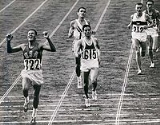
Billy Mills
Overview
William Mervin Mills or "Billy" Mills, also known as Makata Taka Hela (born June 30, 1938), is the second Native American
to win an Olympic
gold medal
.
He accomplished this feat in the 10,000 meter run
at the 1964 Tokyo Olympics
, becoming the only American
ever to win the Olympic gold in this event. His 1964 victory is considered one of the greatest of Olympic upsets. A former United States Marine, Billy Mills is a member of the Oglala
Lakota (Sioux
) Tribe
.
William Mervin Mills was born in Pine Ridge, South Dakota
, and was raised on the impoverished Pine Ridge Indian Reservation
for Oglala Sioux people.
Native Americans in the United States
Native Americans in the United States are the indigenous peoples in North America within the boundaries of the present-day continental United States, parts of Alaska, and the island state of Hawaii. They are composed of numerous, distinct tribes, states, and ethnic groups, many of which survive as...
to win an Olympic
Olympic Games
The Olympic Games is a major international event featuring summer and winter sports, in which thousands of athletes participate in a variety of competitions. The Olympic Games have come to be regarded as the world’s foremost sports competition where more than 200 nations participate...
gold medal
Gold medal
A gold medal is typically the medal awarded for highest achievement in a non-military field. Its name derives from the use of at least a fraction of gold in form of plating or alloying in its manufacture...
.
He accomplished this feat in the 10,000 meter run
Athletics at the 1964 Summer Olympics - Men's 10000 metres
The men's 10,000 metres was the longest of the seven men's track races in the Athletics at the 1964 Summer Olympics program in Tokyo. It was held on 14 October...
at the 1964 Tokyo Olympics
1964 Summer Olympics
The 1964 Summer Olympics, officially known as the Games of the XVIII Olympiad, was an international multi-sport event held in Tokyo, Japan in 1964. Tokyo had been awarded with the organization of the 1940 Summer Olympics, but this honor was subsequently passed to Helsinki because of Japan's...
, becoming the only American
United States
The United States of America is a federal constitutional republic comprising fifty states and a federal district...
ever to win the Olympic gold in this event. His 1964 victory is considered one of the greatest of Olympic upsets. A former United States Marine, Billy Mills is a member of the Oglala
Oglala Lakota
The Oglala Lakota or Oglala Sioux are one of the seven subtribes of the Lakota people; along with the Nakota and Dakota, they make up the Great Sioux Nation. A majority of the Oglala live on the Pine Ridge Indian Reservation in South Dakota, the eighth-largest Native American reservation in the...
Lakota (Sioux
Sioux
The Sioux are Native American and First Nations people in North America. The term can refer to any ethnic group within the Great Sioux Nation or any of the nation's many language dialects...
) Tribe
Tribe
A tribe, viewed historically or developmentally, consists of a social group existing before the development of, or outside of, states.Many anthropologists use the term tribal society to refer to societies organized largely on the basis of kinship, especially corporate descent groups .Some theorists...
.
William Mervin Mills was born in Pine Ridge, South Dakota
Pine Ridge, South Dakota
Pine Ridge is a census-designated place in and the most populous community of Shannon County, South Dakota, United States. The population was 3,308 at the 2010 census. It is the tribal headquarters of the Oglala Sioux Tribe on the Pine Ridge Indian Reservation.-History:By 2011, a gang culture...
, and was raised on the impoverished Pine Ridge Indian Reservation
Pine Ridge Indian Reservation
The Pine Ridge Indian Reservation is an Oglala Sioux Native American reservation located in the U.S. state of South Dakota. Originally included within the territory of the Great Sioux Reservation, Pine Ridge was established in 1889 in the southwest corner of South Dakota on the Nebraska border...
for Oglala Sioux people.
Unanswered Questions

